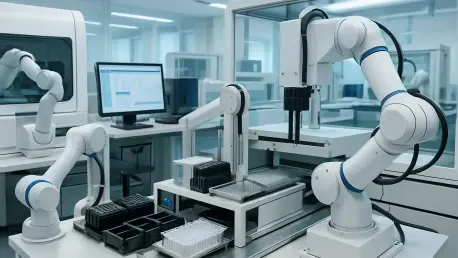In an era where scientific breakthroughs demand speed, precision, and scalability, Ginkgo Bioworks stands at the forefront of a transformative movement in the biotech industry by harnessing artificial intelligence (AI) to redefine lab automation. With the global lab automation market currently valued at $8.8 billion and projected to surge to $14.78 billion by 2034, Ginkgo is not merely riding the wave of innovation but actively shaping its trajectory. This Boston-based company has evolved from creating internal tools for synthetic biology to offering cutting-edge commercial solutions that empower corporate and government clients alike. Their approach integrates advanced automation systems with intelligent AI, promising to accelerate research and discovery in ways previously unimaginable. By focusing on efficiency and adaptability, Ginkgo is tackling some of the most pressing challenges in scientific workflows, positioning itself as a leader in a competitive landscape. This exploration delves into the strategies, technologies, and partnerships that underscore Ginkgo’s pivotal role in crafting the future of lab automation.
Transforming Research with Cutting-Edge Automation
Ginkgo Bioworks has carved a niche by developing innovative tools like Reconfigurable Automation Carts (RACs), originally designed to streamline their own synthetic biology processes but now revolutionizing external research environments. A landmark achievement came through a $4.66 million contract with the U.S. Department of Energy’s Environmental Molecular Sciences Laboratory (EMSL), where Ginkgo deployed an integrated workcell featuring 18 devices within a modular anaerobic chamber. This setup demonstrated a staggering reduction in manual labor by up to 88%, as seen in parallel collaborations. Such advancements highlight how Ginkgo’s automation solutions are tailored to handle intricate phenotyping tasks remotely, freeing researchers from repetitive duties and allowing focus on higher-level analysis. The adaptability of RACs to diverse lab needs underscores a shift toward modular systems that can be customized for specific scientific challenges, setting a new benchmark for operational efficiency across the industry.
Beyond the impressive hardware, Ginkgo’s automation strategy addresses the broader demand for scalability in research settings, particularly in high-stakes environments like government-funded projects. The success of their EMSL deployment serves as a powerful case study, illustrating the potential for these tools to transform complex workflows into seamless, automated processes. This isn’t just about cutting labor costs; it’s about redefining the pace at which discoveries are made. By enabling remote operation and minimizing human intervention, Ginkgo’s systems ensure consistency and accuracy in data collection, which are critical for advancing fields like environmental science and molecular research. As more institutions recognize the value of such technology, Ginkgo’s influence is poised to expand, driving a paradigm shift in how laboratories operate. The ripple effect of these innovations could redefine standards for efficiency, pushing competitors to adapt or risk falling behind in an increasingly automated world.
Harnessing AI for Unmatched Precision and Speed
At the core of Ginkgo Bioworks’ innovation lies a seamless integration of AI into their automation platforms, creating systems that don’t just perform tasks but learn and optimize in real time. The RACs are equipped with sophisticated web-based software, API gateway access, and machine learning models that enable autonomous scientific workflows. A striking example of this capability is their partnership with Aura Genetics, a CLIA-certified diagnostic lab, where joint protocol development and real-time error resolution allow the processing of tens of thousands of samples daily with minimal human oversight. This level of automation transcends traditional lab practices, offering a glimpse into a future where self-optimizing laboratories become the norm. The ability of AI to refine experiments on the fly significantly shortens discovery cycles, providing a competitive edge in diagnostics and beyond, where precision and speed are paramount to success.
Moreover, the incorporation of AI into Ginkgo’s systems addresses a critical need for data-driven decision-making in scientific research, particularly in high-throughput environments. By leveraging machine learning, these platforms can identify patterns and anomalies that might escape human notice, ensuring higher accuracy in results while reducing the risk of costly errors. This technology is especially transformative in fields like drug discovery, where early identification of potential issues can save years of development time. The partnership with Aura Genetics exemplifies how AI-driven automation can scale operations without sacrificing quality, meeting the growing demand for rapid, reliable testing in diagnostics. As industries increasingly prioritize efficiency, Ginkgo’s forward-thinking approach positions it as a trailblazer, capable of meeting today’s needs while anticipating tomorrow’s challenges in an ever-evolving technological landscape.
Expanding Horizons in a Booming Market
Ginkgo Bioworks is strategically positioning itself to capture a significant share of the expanding lab automation market by targeting diverse sectors such as diagnostics, drug discovery, and government research. Their Ginkgo Datapoints service offers cost-competitive high-throughput ADME (Absorption, Distribution, Metabolism, and Excretion) profiling, addressing critical needs in pharmaceutical development while undercutting international competitors on price and data security. Additionally, high-value government contracts, like the one with EMSL, provide stable revenue and bolster credibility through impactful case studies. The Ginkgo Technology Network, uniting over 25 partners across AI, genetic medicines, and manufacturing, further enhances their platform by integrating varied technologies into a cohesive R&D experience. This multi-pronged approach not only diversifies income streams but also mitigates risks tied to market-specific fluctuations, cementing Ginkgo’s role as a versatile industry leader.
Equally important is how Ginkgo tackles specific pain points across the biotech value chain, from boosting throughput in diagnostics to enhancing security in drug discovery. Their solutions cater to the rising demand for at-home testing by ensuring accuracy at scale, while government partnerships open doors to long-term, high-margin projects. This strategic expansion isn’t merely about growth; it’s about building a robust ecosystem where innovation thrives through collaboration. By aligning with entities that share a vision for technological advancement, Ginkgo reduces bottlenecks like silos and switching costs, creating a unified platform for research. As the lab automation market continues its upward trajectory toward $14.78 billion by 2034, Ginkgo’s ability to adapt and innovate across multiple domains ensures it remains a formidable player, ready to capitalize on emerging opportunities while addressing the unique challenges of each sector it serves.
Navigating Growth Amidst Competitive Pressures
Ginkgo Bioworks’ trajectory in the lab automation space is marked by immense potential, fueled by their first-mover advantage in AI-integrated systems and a sharp focus on niche markets like anaerobic research and diagnostics. Their ability to secure high-margin contracts and commercialize proprietary technology paints a promising picture for investors eyeing growth in a burgeoning industry. However, scaling operations to meet rising demand presents significant hurdles, requiring substantial investment in infrastructure and talent. Competition from established giants with deep resources and agile startups with innovative offerings adds another layer of complexity. Despite these challenges, Ginkgo’s strategic alliances and technological edge provide a buffer, enabling them to carve out a distinct space in the market. Their commitment to addressing specialized needs offers a defensive strategy against broader competitive threats, ensuring relevance in a crowded field.
Looking back, Ginkgo Bioworks demonstrated remarkable foresight by integrating AI and automation early on, which allowed them to secure pivotal partnerships and achieve labor reductions that reshaped research efficiency. Reflecting on their journey, it’s clear that their success hinged on balancing innovation with practical application, as seen in projects that prioritized scalability and precision. For the future, the focus should shift toward strengthening operational frameworks to handle increased demand without compromising quality. Exploring additional niche markets and deepening collaborations within the Ginkgo Technology Network could further solidify their standing. Additionally, investing in robust risk management strategies will be crucial to mitigate competitive pressures and scaling challenges. As the industry evolves, Ginkgo’s ability to adapt while maintaining a clear vision for AI-driven automation will determine how they continue to influence the landscape of scientific discovery in the years ahead.









